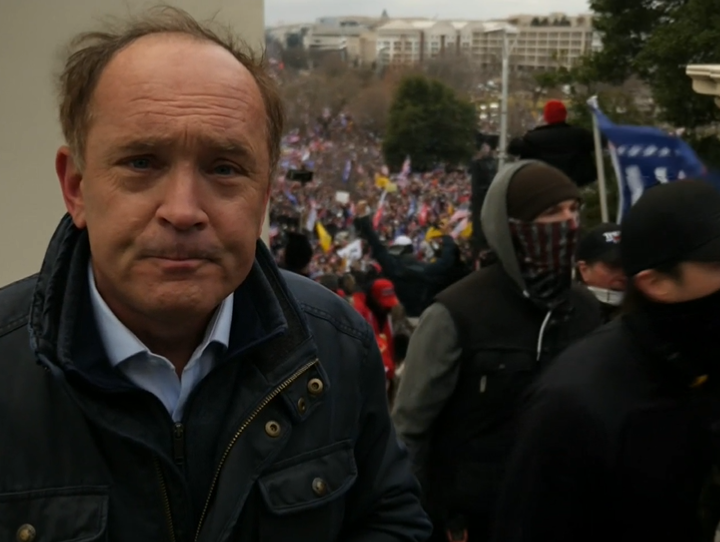
The award-winning journalist who captured the attack on the US Capitol last January has warned an erosion in local journalism has created a “news desert” that is increasing the risk of a similar attack happening in the UK.
Robert Moore, the ITV News correspondent who won Press Gazette’s journalist of the year award in December for his reporting of the 6 January 2021 US Capitol attack, said the fall of local journalism meant charting the “erosion of democracy” had now become a struggle.
The comments, made at a joint Royal Television Society and ITV News panel on Tuesday, mirrored similar points made by CNN chief media correspondent Brian Stelter, Labour Shadow Culture Secretary Lucy Powell and Conservative MP Damian Collins.
Stelter said journalists must be more forceful in their coverage of “democratic backsliding” and need to change the way they report on more small-scale attacks on democracy, while the BBC was described as the “last local newsroom standing” in parts of the UK by Powell.
Responding to a question from host Cathy Newman of Channel 4 News on whether the risk of a Capitol-style attack could happen in the UK, Moore said: “What happens in America can very easily happen in other countries, particularly because we’re talking about this global polarisation that’s fed by algorithms and the toxicity of social media feeds.
“In one sense, [the Capitol attack] was a profoundly visual story that played to the strength of television news… the next stage of deep reporting is going to be much more challenging because it’s going to be about what happens at local school boards or election boards. It’s going to be much more micro.
“And that plays into one of the great weaknesses we’ve talked about, that’s playing out here, but also in the UK, which is the fragility of local journalism.
“It’s often called a news desert because of the lack of deep reporting at a local, regional and state level. There’s no way better to chart the erosion of democracy than at a local level. And now we don’t have the plurality of media at a local level to do that right now.”
Previous analysis in August 2020 by Press Gazette found that 33 local papers had closed in the UK since the start of 2019. In the US, Poynter research revealed more than 100 local newsrooms have shut since the beginning of the pandemic.
Moore was responding to earlier comments by CNN correspondent Stelter, who said: “Whether it’s a major publication or a local newspaper, we have to be explaining what democratic backsliding is and what it looks like and how we see it happening.
“What are the signs of erosion, because they’re not always going to be visual and physical at the steps of the Capitol building.
“They’re usually going to happen in closed-door meetings, or in smaller hearing rooms or a council where voting rights are pulled back, and whether when changes are made to the way votes are counted. All of those small steps, you know, that’s all erosion that needs to be documented.”
Collins, a former chairman of the Digital, Culture, Media and Sport Committee, added: “We’ve all seen the hollowing out of local journalism in the UK, maybe not quite as dramatically as has happened in America.
“But local newsgathering for newspapers, has been greatly undermined by the expansion of the big tech platforms. And we need to make sure that public service broadcasting has a vibrant role to play in the world of big tech.”
The impact big tech has had on the prominence, style and survival of local journalism was a repeat feature of the talk.
Collins suggested that the government should consider using anti-trust laws to undermine tech giants and “make more of a level playing field” if it continues to be the case that their platforms control which publishers see traffic.
The Conservative MP and chair of the parliamentary committee on the Online Safety Bill also reacted to Culture Secretary Nadine Dorries’s announcement that she wants to find a new funding model for the BBC after its current deal ends in 2027.
Collins said: “I think there are questions for the BBC about the way it is funded, and whether in a digital age where people are increasingly used to paying for just what they consume, you know, they have different subscriptions, does a catch-all licence fee work? Are younger people in particular still going to take it up?”
“It’s not totally clear really what the government’s position now is,” said Labour’s Powell. “But I don’t think things like local news, for which the BBC is really the last local newsroom standing in most parts of the country… could stand over a period of time under a commercial ethos or an ethos that was trying to drum up subscriptions.”
Powell previously said that the government was signalling “the end of the BBC as we know it” in a “pathetic” attempt to distract from Boris Johnson’s difficulties over Downing Street parties.
Email pged@pressgazette.co.uk to point out mistakes, provide story tips or send in a letter for publication on our "Letters Page" blog
